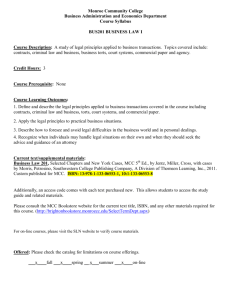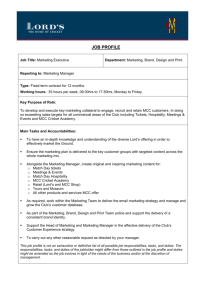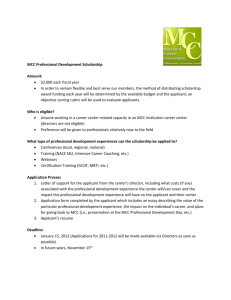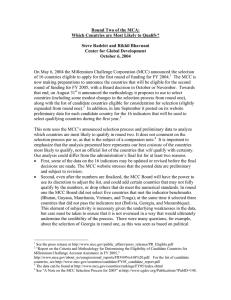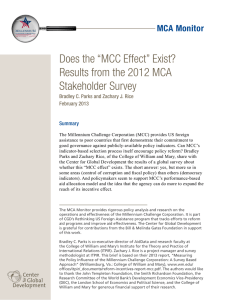Good Public Governance for Whom?
advertisement
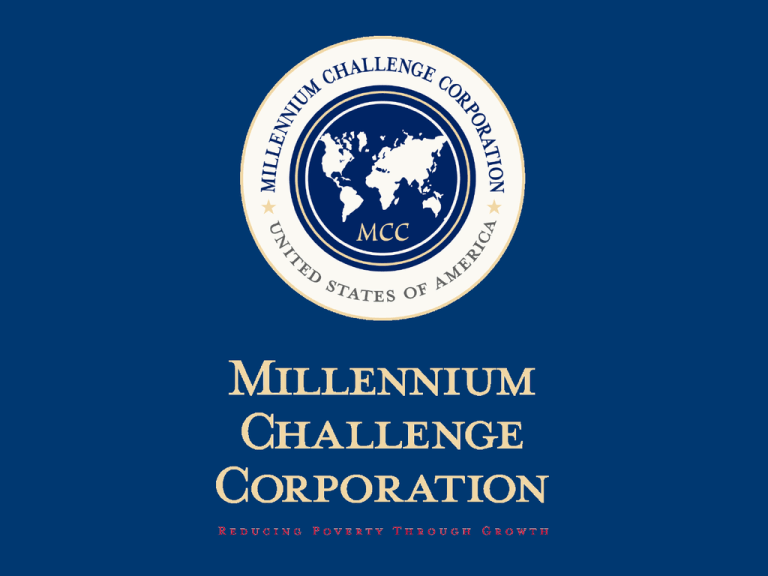
Good Public Governance for Whom? Session title suggests two questions: What is “Good Public Governance”? Whom does it benefit and how? The MCC approach to using development assistance to improve public governance The use of technical data by the MCC to improve the effectiveness of ODA Millennium Challenge Corporation MCC is a new US foreign assistance agency designed to “reduce poverty through sustainable economic growth” Progress, if defined as the reduction of poverty, is strongly correlated with rising income levels in poor countries “We want to make decisions ourselves. It is our country, and we have to take on leadership and responsibilities. If you take a look at the last two issues, our vision and country ownership, you will realize why the MCA is so important for us. Here we have a new approach which helps us to implement our vision.” --Marc Ravalomanana, The President of Madagascar The Foundations of MCC’s Assistance 1) 2) 3) 4) Rapid economic growth is essential for significant poverty alleviation Governance matters for aid effectiveness Country ownership is critical The objective is to generate results MCC Use of Indicators and Statistics Indicators to Determine Eligibility Evidence-based Constraints Analysis Monitoring and Evaluation Good Governance Practices → Eligibility MCA eligibility is a reward to countries with good governance and an incentive for others to improve policies Eligibility is based on scoring above the median on Corruption and on at least half of 16 indicators in each of the three policy categories: Ruling Justly Investing in People Encouraging Economic Freedom Indicators for Eligibility Ruling Justly: Investing in People: Civil Liberties (Freedom House) Political Rights (Freedom House) Voice and Accountability (WBI) Government Effectiveness (WBI) Rule of Law (WBI) Control of Corruption (WBI) Public Expenditure on Health (National Data) Immunization (WHO) Primary Education Spending (WB) Girls' Primary Education Completion (WB) Economic Freedom: Cost of Starting a Business (WB/IFC) Inflation (IMF, WEO, IFS) Fiscal Policy (IMF, WEO) Days to Start a Business (WB/IFC) Trade Policy (Heritage Foundation) Regulatory Quality Rating (WBI) WBI: World Bank Institute WB/IFC: World Bank/Int’l Finance Corp IFS: International Financial Statistics WHO: World Health Organization WEO: World Economic Outlook Constraints Analysis Eligible countries undertake assessment before developing program Objective is to identify binding constraints to economic growth Analysis must be rigorous – based on evidence and economic theory Program proposal should be directed at relaxing these constraints MCC is Results Based MCC will fund projects that can be demonstrated to have an adequate economic rate of return Specific objectives and measures of success are developed as part of project design A monitoring and evaluation plan is an integral part of each Compact Funding is contingent upon performance on the indicators and meeting mutually agreed benchmarks for program implementation Conclusions Statistics can enhance aid effectiveness and enhance progress in reducing poverty by: Identifying countries where aid is more likely to be used well to help target resource allocation; Identifying the problems that constrain growth to help countries design appropriate remedies; and by Identifying, through rigorous impact evaluation, the strategies that are most effective at achieving their fundamental objectives to help inform future program design Thank you! Franck Wiebe Managing Director, Economic Analysis Millennium Challenge Corporation www.mcc.gov MCA Compact Funding (in millions of dollars) Close to $3.0 Billion in Compacts Approved $460.94 El Salvador $109.8 Madagascar $110 Cape Verde $295.3 Georgia $461 Mali $307.3 Benin $215 Honduras $175 Nicaragua $547 Ghana $235.65 Armenia $65.69 Vanuatu
